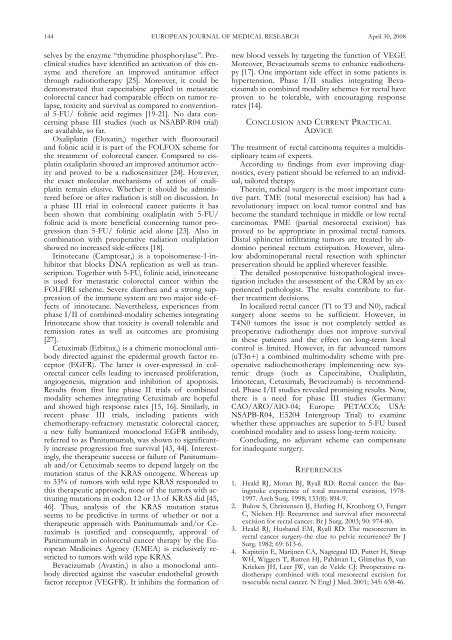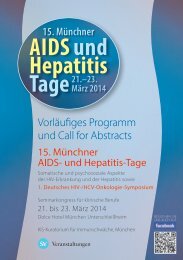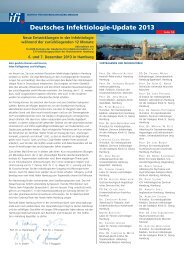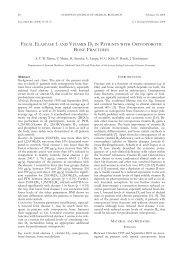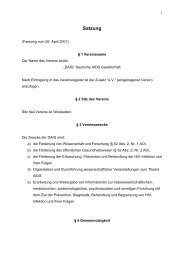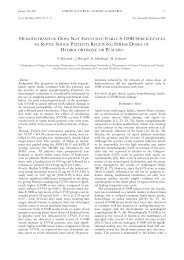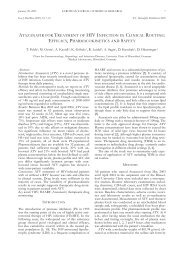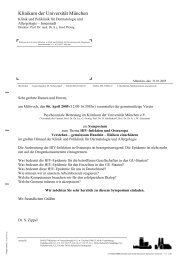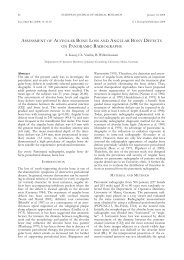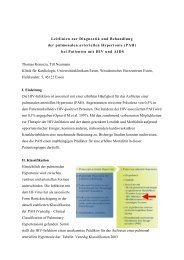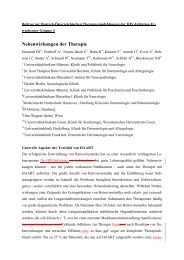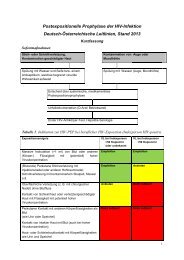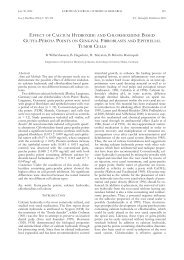MODERN THERAPY OF RECTAL CARCINOMA - ResearchGate
MODERN THERAPY OF RECTAL CARCINOMA - ResearchGate
MODERN THERAPY OF RECTAL CARCINOMA - ResearchGate
Create successful ePaper yourself
Turn your PDF publications into a flip-book with our unique Google optimized e-Paper software.
144 EUROPEAN JOURNAL <strong>OF</strong> MEDICAL RESEARCH<br />
April 30, 2008<br />
selves by the enzyme “thymidine phosphorylase”. Preclinical<br />
studies have identified an activation of this enzyme<br />
and therefore an improved antitumor effect<br />
through radiotiotherapy [25]. Moreover, it could be<br />
demonstrated that capecitabine applied in metastatic<br />
colorectal cancer had comparable effects on tumor relapse,<br />
toxicity and survival as compared to conventional<br />
5-FU/ folinic acid regimes [19-21]. No data concerning<br />
phase III studies (such as NSABP-R04 trial)<br />
are available, so far.<br />
Oxaliplatin (Eloxatin‚) together with fluorouracil<br />
and folinic acid it is part of the FOLFOX scheme for<br />
the treatment of colorectal cancer. Compared to cisplatin<br />
oxaliplatin showed an improved antitumor activity<br />
and proved to be a radiosensitizer [24]. However,<br />
the exact molecular mechanisms of action of oxaliplatin<br />
remain elusive. Whether it should be administered<br />
before or after radiation is still on discussion. In<br />
a phase III trial in colorectal cancer patients it has<br />
been shown that combining oxaliplatin with 5-FU/<br />
folinic acid is more beneficial concerning tumor progression<br />
than 5-FU/ folinic acid alone [23]. Also in<br />
combination with preoperative radiation oxaliplation<br />
showed no increased side-effects [18].<br />
Irinotecane (Camptosar‚) is a topoisomerase-1-inhibitor<br />
that blocks DNA replication as well as transcription.<br />
Together with 5-FU, folinic acid, irinotecane<br />
is used for metastatic colorectal cancer within the<br />
FOLFIRI scheme. Severe diarrhea and a strong suppression<br />
of the immune system are two major side-effects<br />
of irinotecane. Nevertheless, experiences from<br />
phase I/II of combined-modality schemes integrating<br />
Irinotecane show that toxicity is overall tolerable and<br />
remission rates as well as outcomes are promising<br />
[27].<br />
Cetuximab (Erbitux‚) is a chimeric monoclonal antibody<br />
directed against the epidermal growth factor receptor<br />
(EGFR). The latter is over-expressed in colorectal<br />
cancer cells leading to increased proliferation,<br />
angiogenesis, migration and inhibition of apoptosis.<br />
Results from first line phase II trials of combined<br />
modality schemes integrating Cetuximab are hopeful<br />
and showed high response rates [15, 16]. Similarly, in<br />
recent phase III trials, including patients with<br />
chemotherapy-refractory metastatic colorectal cancer,<br />
a new fully humanized monoclonal EGFR antibody,<br />
referred to as Panitumumab, was shown to significantly<br />
increase progression free survival [43, 44]. Interestingly,<br />
the therapeutic success or failure of Panitumumab<br />
and/or Cetuximab seems to depend largely on the<br />
mutation status of the KRAS oncogene. Whereas up<br />
to 33% of tumors with wild type KRAS responded to<br />
this therapeutic approach, none of the tumors with activating<br />
mutations in codon 12 or 13 of KRAS did [45,<br />
46]. Thus, analysis of the KRAS mutation status<br />
seems to be predictive in terms of whether or not a<br />
therapeutic approach with Panitumumab and/or Cetuximab<br />
is justified and consequently, approval of<br />
Panitumumab in colorectal cancer therapy by the European<br />
Medicines Agency (EMEA) is exclusively restricted<br />
to tumors with wild type KRAS.<br />
Bevacizumab (Avastin‚) is also a monoclonal antibody<br />
directed against the vascular endothelial growth<br />
factor receptor (VEGFR). It inhibits the formation of<br />
new blood vessels by targeting the function of VEGF.<br />
Moreover, Bevacizumab seems to enhance radiotherapy<br />
[17]. One important side effect in some patients is<br />
hypertension. Phase I/II studies integrating Bevacizumab<br />
in combined modality schemes for rectal have<br />
proven to be tolerable, with encouraging response<br />
rates [14].<br />
CONCLUSION AND CURRENT PRACTICAL<br />
ADVICE<br />
The treatment of rectal carcinoma requires a multidisciplinary<br />
team of experts.<br />
According to findings from ever improving diagnostics,<br />
every patient should be referred to an individual,<br />
tailored therapy.<br />
Therein, radical surgery is the most important curative<br />
part. TME (total mesorectal excision) has had a<br />
revolutionary impact on local tumor control and has<br />
become the standard technique in middle or low rectal<br />
carcinomas. PME (partial mesorectal excision) has<br />
proved to be appropriate in proximal rectal tumors.<br />
Distal sphincter infiltrating tumors are treated by abdomino<br />
perineal rectum extirpation. However, ultralow<br />
abdominoperanal rectal resection with sphincter<br />
preservation should be applied wherever feasible.<br />
The detailed postoperative histopathological investigation<br />
includes the assessment of the CRM by an experienced<br />
pathologist. The results contribute to further<br />
treatment decisions.<br />
In localized rectal cancer (T1 to T3 and N0), radical<br />
surgery alone seems to be sufficient. However, in<br />
T4N0 tumors the issue is not completely settled as<br />
preoperative radiotherapy does not improve survival<br />
in these patients and the effect on long-term local<br />
control is limited. However, in far advanced tumors<br />
(uT3n+) a combined multimodality scheme with preoperative<br />
radiochemotherapy implementing new systemic<br />
drugs (such as Capecitabine, Oxaliplatin,<br />
Irinotecan, Cetuximab, Bevacizumab) is recommended.<br />
Phase I/II studies revealed promising results. Now,<br />
there is a need for phase III studies (Germany:<br />
CAO/ARO/AIO-04; Europe: PETACC6; USA:<br />
NSAPB-R04, E5204 Intergroup Trial) to examine<br />
whether these approaches are superior to 5-FU based<br />
combined modality and to assess long-term toxicity.<br />
Concluding, no adjuvant scheme can compensate<br />
for inadequate surgery.<br />
REFERENCES<br />
1. Heald RJ, Moran BJ, Ryall RD: Rectal cancer: the Basingstoke<br />
experience of total mesorectal excision, 1978-<br />
1997. Arch Surg. 1998; 133(8): 894-9.<br />
2. Bulow S, Christensen IJ, Harling H, Kronborg O, Fenger<br />
C, Nielsen HJ: Recurrence and survival after mesorectal<br />
excision for rectal cancer. Br J Surg. 2003; 90: 974-80.<br />
3. Heald RJ, Husband EM, Ryall RD: The mesorectum in<br />
rectal cancer surgery-the clue to pelvic recurrence? Br J<br />
Surg. 1982; 69: 613-6.<br />
4. Kapiteijn E, Marijnen CA, Nagtegaal ID, Putter H, Steup<br />
WH, Wiggers T, Rutten HJ, Pahlman L, Glimelius B, van<br />
Krieken JH, Leer JW, van de Velde CJ: Preoperative radiotherapy<br />
combined with total mesorectal excision for<br />
resectable rectal cancer. N Engl J Med. 2001; 345: 638-46.


